April 25th. Weather good. Regular routine of duty is now on again. Drill, dress parade, picket, and guard. Not much interest taken in these duties at this time. No danger now from the enemy. The only real interest is taken in our dress parades, as we have many visitors from town. Confederate soldiers are now on their way home, all having been paroled. Halt them at the outposts, send a guard with them to the Provost Marshal, when they are allowed to proceed to their homes in Virginia and Maryland. Many were glad the war was over. Some were very bitter. Would not admit they were beaten. We laughed at the poor fellows. Many having tramped for miles to reach home. Some shed tears when they were forced to admit that the war was over, and their cause was lost.
American Civil War Chronicles
Diary of a Southern Refugee, Judith White McGuire.
April 25, 2025
25th.—J. P. arrived to-day direct from Mosby’s command, which is disbanded, but has not surrendered. He is full of enthusiasm and visions of coming success, and is bent on joining Johnston. Dear boy, his hopeful spirit has infected me, and aroused a hope which I am afraid to indulge.
Downing’s Civil War Diary.—Alexander G. Downing.
April 25, 2025
Tuesday, 25th—We broke camp again and at 7 a. m. started to move forward, our division, the Fourth, taking up the rear. We marched six miles and went into camp for the night. All is quiet in the front. Deserters from Johnston’s army are still coming in from the front. They declare that they do not want to do any more fighting, for they know that their cause is lost. They also expressed the belief that Johnston would surrender without fighting.
War Diary of Luman Harris Tenney.
April 24, 2025
24th. Spent the morning at home. In the P. M. went with the girls to Monthly Rhetoricals. Charley Fairchild had an exercise entitled, “One Year with Red Tape.” Good. After his exercise we walked about town.
Diary of a Southern Refugee, Judith White McGuire.
April 24, 2025
W., 24th.—On Saturday evening my brother’s wagon met us at the depot and brought us to this place, beautiful in its ruins. We have not been here since the besom of destruction swept over it, and to us, who have been in the habit of enjoying its hospitality when all was bright and cheerful, the change is very depressing. We miss the respectful and respectable servants, born in the family and brought up with an affection for the household which seemed a part of their nature, and which so largely contributed to the happiness both of master and servant. Even the nurse of our precious little J., the sole child of the house, whose heart seemed bound up in her happiness, has gone. It is touching to hear the sweet child’s account of the shock she experienced when she found that her “mammy,” deceived and misled by the minions who followed Grant’s army, had left her; and to see how her affection still clings to her, showing itself in the ardent hope that her “mammy” has found a comfortable home. The army had respected the interior of the house, because of the protection of the officers. Only one ornament was missing, and that was the likeness of this dear child. Since the fall of Richmond, a servant of the estate, who had been living in Washington, told me that it was in the possession of a maid-servant of the house, who showed it to him, saying that she “looked at it every day.” We all try to be cheerful and to find a bright side; and we occupy the time as cheerfully as we can. The governess having returned to her home in Norfolk, I shall employ myself in teaching my bright little niece here and the dear children at S. H., and feel blessed to have so pleasant a duty.
Village Life in America
April 24, 2025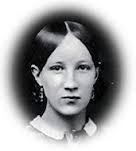
April 24.–Fannie Gaylord and Kate Lapham have returned from their eastern trip and told us of attending the President’s funeral in Albany, and I had a letter from Bessie Seymour, who is in New York, saying that she walked in the procession until half past two in the morning, in order to see his face. They say that they never saw him in life, but in death he looked just as all the pictures represent him. We all wear Lincoln badges now, with pin attached. They are pictures of Lincoln upon a tiny flag, bordered with crape. Susie Daggett has just made herself a flag, six feet by four. It was a lot of work. Mrs. Noah T. Clarke gave one to her husband upon his birthday, April 8. I think everybody ought to own a flag.
Downing’s Civil War Diary.—Alexander G. Downing.
April 24, 2025
Monday, 24th—The Seventeenth Army Corps marched to Raleigh this afternoon and was reviewed by Lieutenant-General Grant and Major-General Sherman. Their reviewing stand was in front of the governor’s mansion. The army was glad to see their old commander once more. We received orders to move forward in the morning, since the terms of the surrender of Johnston’s army were not approved by the War Department at Washington. This is not good news for us, but we are hoping that Johnston will surrender without more fighting.
Downing’s Civil War Diary.—Alexander G. Downing.
April 23, 2025
Sunday, 23d–We had regimental inspection at 10 a. m. and this afternoon at 2 o’clock our division was reviewed by General Smith. The division came out in good style.
War Diary of Luman Harris Tenney.
April 23, 2025
23rd. Was unable to get out on account of my neck. Read Thede’s diaries to Ma and Melissa, and talked about him. Minnie in a short time. Read Atlantic. Melissa went to church in P. M. Played with Carrie. Quite a wintry day. Prof. Peck very kind to the family.
Through Some Eventful Years
April 23, 2025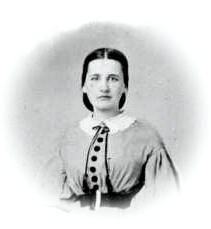
April 23rd, 1865.—I ought to be ashamed of myself and yet I am afraid I am not. For the first time in all my life I have laid hands in violence upon a negro.
It happened in this way. We were sitting last night in the back parlor, the two tallow candles did little more than to make the darkness visible, but it was moon-light outside. Since we have been in the enemy’s lines, we feel suspicious of all unusual sounds at night and often we have discovered listeners, under the windows or the servants, employed about the house, have “toted news” to the camp at Centreville. So when footsteps were heard approaching, I looked out and saw some twenty or more half-grown negro boys and girls. When they reached the house they began to sing, to the tune of “John Brown’s Body,” these words:
“We’ll hang Jeff Davis on a sour apple tree,
We’ll hang Jeff Davis on a sour apple tree,
We’ll hang Jeff Davis on a sour apple tree,
As we go marching on.”
In the corner of the dining-room stood a new carriage whip, purchased that day by Jordan, who considered himself a judge of carriage whips. His mistress had given him money that morning to buy it and this is what he said when he brought it in, “Miss Patsy, here’s de whup, its a rale sure nuf whale-bone whup and de lash is twisted silk.”
I seized it as I passed through the dining room to get out in the yard. The negroes were evidently expecting to make us angry but they had not counted on the reception they received. I rushed in their midst and, laying the whip about me with all the strength I could muster, I soon had the whole crowd flying toward the Quarter, screaming as they went. One of them screeching loudly, “She dun outen my eye,” another, “Oh, Lordy—Mammy ain’t nuver laid it on me lak
I would have followed up the victory but behind the magnolia tree a dark figure was visible and I did not know how many more there might be. It was over so quickly that no one realized what was taking place until the screams broke on the air. It amused the family to think for nineteen years I had lived on the plantation and never before had I struck a negro.
Susan Bradford is 19 years old when this entry was made.
A Diary From Dixie.
April 23, 2025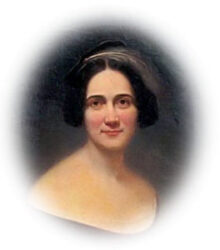
April 23d.–My silver wedding-day, and I am sure the unhappiest day of my life. Mr. Portman came with Christopher Hampton. Portman told of Miss Kate Hampton, who is perhaps the most thoroughly ladylike person in the world. When he told her that Lee had surrendered she started up from her seat and said, “That is a lie.” “Well, Miss Hampton, I tell the tale as it was told me. I can do no more.”
No wonder John Chesnut is bitter. They say Mulberry has been destroyed by a corps commanded by General Logan. Some one asked coolly, “Will General Chesnut be shot as a soldier, or hung as a senator?” “I am not of sufficient consequence,” answered he. “They will stop short of brigadiers. I resigned my seat in the United States Senate weeks before there was any secession. So I can not be hung as a senator. But after all it is only a choice between drumhead court martial, short shrift, and a lingering death at home from starvation.”
These negroes are unchanged. The shining black mask they wear does not show a ripple of change; they are sphinxes. Ellen has had my diamonds to keep for a week or so. When the danger was over she handed them back to me with as little apparent interest in the matter as if they had been garden peas.
Mrs. Huger was in church in Richmond when the news of the surrender came. Worshipers were in the midst of the communion service. Mr. McFarland was called out to send away the gold from his bank. Mr. Minnegerode’s English grew confused. Then the President was summoned, and distress of mind showed itself in every face. The night before one of General Lee’s aides, Walter Taylor, was married, and was off to the wars immediately after the ceremony.
One year ago we left Richmond. The Confederacy has double-quicked down hill since then. One year since I stood in that beautiful Hollywood by little Joe Davis’s grave. Now we have burned towns, deserted plantations, sacked villages. “You seem resolute to look the worst in the face,” said General Chesnut, wearily. “Yes, poverty, with no future and no hope.” “But no slaves, thank God!” cried Buck. “We would be the scorn of the world if the world thought of us at all. You see, we are exiles and paupers.” “Pile on the agony.” “How does our famous captain, the great Lee, bear the Yankees’ galling chain?” I asked. “He knows how to possess his soul in patience,” answered my husband. “If there were no such word as subjugation, no debts, no poverty, no negro mobs backed by Yankees; if all things were well, you would shiver and feel benumbed,” he went on, pointing at me in an oratorical attitude. “Your sentence is pronounced–Camden for life.”
Downing’s Civil War Diary.—Alexander G. Downing.
April 22, 2025
Saturday, 22d–It is quite pleasant today. I went out with a team after a load of lumber for our company. We pulled down an old, vacant barn. No property is being burned and destroyed in this state, and only vacant buildings are torn down to get lumber with which to build “ranches.” There is a large amount of land lying idle around here. The field where we have our camp has not been farmed for two or three years. But there are some fine wheat fields here and the wheat is just heading out. We have a fine camp; all of the tents are raised now, and our brigade has shade trees set in rows throughout our camp. There being no trees, we went to the timber and cut down small bushy pine trees for the purpose, setting them in the ground. Our camp looked so fine that the staff artist of Harper’s Weekly took a picture of it for the paper.
War Diary of Luman Harris Tenney.
April 22, 2025
22nd. Went to town in the morning to market. Will Hudson came out. We boys got together and had a jolly time. Floy and George came out. Good visit. Chester came home. Walked with Will to the river, too late for train. A lame stiff neck. Spent a part of evening at Minnie’s. Saw the Hudson family. F. Henderson and Will Keep. Hurrah!
A Confederate Girl’s Diary
April 22, 2025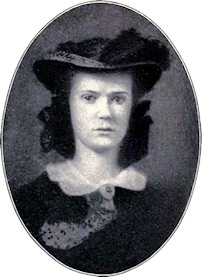
Saturday, 22d April.
To see a whole city draped in mourning is certainly an imposing spectacle, and becomes almost grand when it is considered as an expression of universal affliction. So it is, in one sense. For the more violently “Secesh” the inmates, the more thankful they are for Lincoln’s death, the more profusely the houses are decked with the emblems of woe. They all look to me like “not sorry for him, but dreadfully grieved to be forced to this demonstration.” So all things have indeed assumed a funereal aspect. Men who have hated Lincoln with all their souls, under terror of confiscation and imprisonment which they understand is the alternative, tie black crape from every practicable knob and point to save their homes. Last evening the B––s were all in tears, preparing their mourning. What sensibility! What patriotism! a stranger would have exclaimed. But Bella’s first remark was: “Is it not horrible? This vile, vile old crape! Think of hanging it out when –” Tears of rage finished the sentence. One would have thought pity for the murdered man had very little to do with it.
Coming back in the cars, I had a rencontre that makes me gnash my teeth yet. It was after dark, and I was the only lady in a car crowded with gentlemen. I placed little Miriam on my lap to make room for some of them, when a great, dark man, all in black, entered, and took the seat and my left hand at the same instant, saying, “Good-evening, Miss Sarah.” Frightened beyond measure to recognize Captain Todd[1] of the Yankee army in my interlocutor, I, however, preserved a quiet exterior, and without the slightest demonstration answered, as though replying to an internal question. “Mr. Todd.” “It is a long while since we met,” he ventured. “Four years,” I returned mechanically. “You have been well?” “My health has been bad.” “I have been ill myself”; and determined to break the ice he diverged with “Baton Rouge has changed sadly.” “I hope I shall never see it again. We have suffered too much to recall home with any pleasure.” “I understand you have suffered severely,” he said, glancing at my black dress. “We have yet one left in the army, though,” I could not help saying. He, too, had a brother there, he said.
He pulled the check-string as we reached the house, adding, “This is it,” and absurdly correcting himself with “Where do you live?” – “211. I thank you. Good-evening”; the last with emphasis as he prepared to follow. He returned the salutation, and I hurriedly regained the house. Monsieur stood over the way. A look through the blinds showed him returning to his domicile, several doors below.
I returned to my own painful reflections. The Mr. Todd who was my “sweetheart” when I was twelve and he twenty-four, who was my brother’s friend, and daily at our home, was put away from among our acquaintance at the beginning of the war. This one, I should not know. Cords of candy and mountains of bouquets bestowed in childish days will not make my country’s enemy my friend now that I am a woman.
Village Life in America
April 22, 2025
April 26.–Now we have the news that J. Wilkes Booth, who shot the President and who has beenconcealing himself in Virginia, has been caught, and refusing to surrender was shot dead. It has taken just twelve days to bring him to retribution. I am glad that he is dead if he could not be taken alive, but it seems as though shooting was too good for him. However, we may as well take this as really God’s way, as the death of the President, for if he had been taken alive, the country would have been so furious to get at him and tear him to pieces the turmoil would have been great and desperate. It may be the best way to dispose of him. Of course, it is best, or it would not be so. Mr. Morse called this evening and he thinks Booth was shot by a lot of cowards. The flags have been flying all day, since the news came, but all, excepting Albert Granger, seem sorry that he was not disabled instead of being shot dead. Albert seems able to look into the “beyond ” and also to locate departed spirits. His “latest” is that he is so glad that Booth got to h–l before Abraham Lincoln got to Springfield.
Mr. Fred Thompson went down to New York last Saturday and while stopping a few minutes at St. Johnsville, he heard a man crowing over the death of the President. Mr. Thompson marched up to him, collared him and landed him nicely in the gutter. The bystanders were delighted and carried the champion to a platform and called for a speech, which was given. Quite a little episode. Every one who hears the story, says: “Three cheers for F. F. Thompson.”
The other afternoon at our society Kate Lapham wanted to divert our minds from gossip I think, and so started a discussion upon the respective characters of Washington and Napoleon. It was just after supper and Laura Chapin was about resuming her sewing and she exclaimed, “Speaking of Washington, makes me think that I ought to wash my hands,” so she left the room for that purpose.
Through Some Eventful Years
April 22, 2025
Warning
The following diary entry contains wording that is offensive to many in the world of today. However, the entry is provided unedited for its historical content and context.
April 22nd, 1865.—Aunt Margaret is going back to her home in Tennessee. She had letters today telling her General Fish had possession of her house as his headquarters. As soon as she can get the place she is going back. I will miss my jolly cousins dreadfully and Aunt Margaret too, but I know they will feel better to be at home once more. They have been refugees for four years and they must be tired of wandering.
Brother Junius looks more like himself. He has been to Neck-or-nothing Hall and found the plantation in good order and his servants were so glad to see him. His cook was loud in her denunciations of John, his man, who deserted to the enemy a year ago.
“Dat sure is a sorry nigger,” said she “ter up an’ leffen Marse Junius doubten nobody ter wait on him nur blacken his boots.”
His visit to his plantation did him good, we think. Father has conquered himself and you would never know how terribly he felt and must still feel, though, he is so cheerful and so helpful to others.
Susan Bradford is 19 years old when this entry was made.
A Diary From Dixie.
April 22, 2025
April 22d.–This yellow Confederate quire of paper, my journal, blotted by entries, has been buried three days with the silver sugar-dish, teapot, milk-jug, and a few spoons and forks that follow my fortunes as I wander. With these valuables was Hood’s silver cup, which was partly crushed when he was wounded at Chickamauga.
It has been a wild three days, with aides galloping around with messages, Yankees hanging over us like a sword of Damocles. We have been in queer straits. We sat up at Mrs. Bedon’s dressed, without once going to bed for forty-eight hours, and we were aweary.
Colonel Cadwallader Jones came with a despatch, a sealed secret despatch. It was for General Chesnut. I opened it. Lincoln, old Abe Lincoln, has been killed, murdered, and Seward wounded! Why? By whom? It is simply maddening, all this.
I sent off messenger after messenger for General Chesnut. I have not the faintest idea where he is, but I know this foul murder will bring upon us worse miseries. Mary Darby says, “But they murdered him themselves. No Confederates are in Washington.” “But if they see fit to accuse us of instigating it?” “Who murdered him? Who knows?” “See if they don’t take vengeance on us, now that we are ruined and can not repel them any longer.”
The death of Lincoln I call a warning to tyrants. He will not be the last President put to death in the capital, though he is the first.
Buck never submits to be bored. The bores came to tea at Mrs. Bedon’s, and then sat and talked, so prosy, so wearisome was the discourse, so endless it seemed, that we envied Buck, who was mooning on the piazza. She rarely speaks now.

Downing’s Civil War Diary.—Alexander G. Downing.
April 21, 2025
Friday, 21st–Rain again today. All the men in the five different corps are at work fixing up their camp grounds. The army feels very sad and sorrowful over the death of the president.
War Diary of Luman Harris Tenney.
April 21, 2025
21st. Ate supper yesterday with Minnie. Spent the morning playing with Carrie and reading. Afternoon Minnie and John over to tea. Went up town with Melissa. Fannie in Bellevue teaching. Fortunate for me. Rode out with Charlie. Took Carrie along. Tea at Minnie’s. Music from Joe and John. Fisher and Allie Norton there.
Downing’s Civil War Diary.—Alexander G. Downing.
April 20, 2025
Thursday, 20th–It rained some today. We spent the day in raising our tents. There is great rejoicing in camp. Many think that peace is made, and that in a few days we shall likely start for home.
War Diary of Luman Harris Tenney.
April 20, 2025
20th. Rainy. Reached home on the morning train. Met my good mother at the door. It seemed so good. She seemed perfectly resigned to the loss of Theodore. Never was more happy in my life. Ma and I went down to see Minnie and Melissa. Happy meeting. Beautiful little baby Bertie. Carrie a little angel, good and beautiful. Now could I only see Fannie and be reconciled as of old my happiness would be complete.
0
April 20, 2025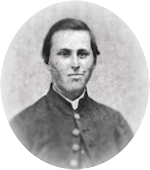
April 20th. Weather fine. Real spring. All is quiet in camp. The body of the martyr President is being carried across the country to his home town, Springfield, Illinois. These are days of mourning. The sudden taking off of Mr. Lincoln is the topic of conversation in our camp. It is generally believed there was a conspiracy among the leaders of the rebellion to murder Mr. Lincoln, so the cry is that the leaders must be punished.
Diary of a Southern Refugee, Judith White McGuire.
April 20, 2025
20th.—The cars on the Central Railroad will run tomorrow, for the first time, under Federal rule, and the day after we will use our passports and free tickets to leave the city—dearer than ever, in its captivity and ruin. It is almost impossible to get current money. A whole-hearted friend from Alexandria met me the other day, and with the straightforward simplicity due to friendship in these trying times, asked me at once, “Has your husband any money?” I told him I thought not. He replied, “Tell him I have between twenty-five and thirty dollars–that’s all—and he shall have half of it; tell him I say so.” Ten dollars were accepted, for the circumstances of want which pressed so hard, and for the kindly spirit in which it was offered. Two other friends came forward to share with us their little all. God help the warm hearts of our conquered but precious country! I know they will be blessed, and that light will yet shine through the blackness of darkness which now surrounds them.
Village Life in America
April 20, 2025
Thursday, April 20.–The papers are full of the account of the funeral obsequies of President Lincoln. We take Harper’s Weekly and every event is pictured so vividly it seems as though we were eye witnesses of it all. The picture of “Lincoln at home” is beautiful. What a dear, kind man he was. It is a comfort to know that the assassination was not the outcome of an organized plot of Southern leaders, but rather a conspiracy of a few fanatics, who undertook in this way to avenge the defeat of their cause. It is rumored that one of the conspirators has been located.
“Good bye, war.”–Army Life of an Illinois Soldier, Charles Wright Wills.
April 19, 2025
Raleigh, April 19, 1865.
Joe Johnston surrendered the whole thing yesterday to Sherman. Our 4th division and a division of the 17th Corps receive the arms, etc. We go into a regular camp tomorrow to await developments. If any more Confederacy crops out, we, I suppose, will go for it, otherwise in a couple of months we’ll muster out. That’s all. Good bye, war.